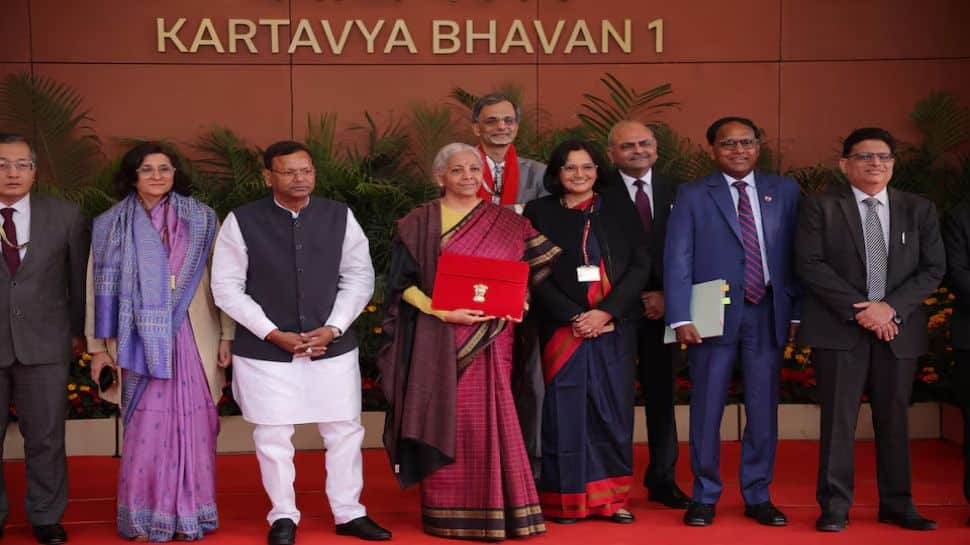Business
Business chiefs urge Trump to ease up on immigration crackdown after Georgia raid

 EPA/Shutterstock
EPA/ShutterstockPresident Donald Trump is facing calls from business leaders to “turn the page” on his immigration crackdown after a raid at a Hyundai plant in the US state of Georgia.
It was the largest such raid in US immigration history, sweeping up 475 workers, including about 300 people from South Korea.
The decision to target the project, backed by a company the president has celebrated for putting money and factories in the US, sparked shock and outrage in South Korea, where politicians and business leaders have warned it will chill willingness to invest in the US.
In the US, business groups said the raid was likely to hit local business activity as well, as it scares off key parts of the workforce.
“Those actions are having ripple and ancillary effects on others, real and unintended, unfortunately whether they’re in legal status or not,” said Jeff Wasden, president of State Business Executives, which represents state lobby groups from businesses across the economy.
He said he had emailed the White House on Monday, hoping the moment provided an opening to shift from enforcement to fixes to the US immigration system.
While praising Trump for stopping the flow of migrants across the border, he said the raids were generating “fear” and “dampening” US economic activity.
“We’ve got to turn the page,” he said. “It’s time to focus on the workforce and how we fix some of these programmes and problems.”
Visa tensions
Since the raid, construction at the site, a partnership between Hyundai and LG Energy Solutions that will make batteries for its electric cars, has halted.
LG and other top South Korean firms have also put new limits on business travel to the US, according to South Korean media.
South Korean officials have indicated that many of those detained who were from South Korea had entered the US on temporary visas that allow workers to visit for business meetings or conferences, but not paid employment in the US.
Such visas have been a common workaround used by businesses in the country, which have long been frustrated that they do not benefit from a more expansive visa programme, like one currently enjoyed by countries such as Australia.
Many Trump supporters oppose loosening visa rules, arguing that such programmes have been used by big business to import cheaper foreign workers and freeze out American citizens.
But as the US pushes to reshore industries such as semiconductors, trade groups say there are not enough workers with the necessary skills in the US.
In a statement to the BBC, Jae Kim, president of the Southeast US Korean Chamber of Commerce, a group aimed at boosting ties between South Korea and the south-eastern US, said it was “not an easy process” for foreign firms to secure visas, especially for temporary workers.
He warned that the hold-ups made it “hard to make such next generation manufacturing projects prosper in the US” and urged a “stronger balance” of US priorities.
In remarks to reporters over the weekend, Trump has acknowledged the complaints about the visa process, telling reporters: “We’re going to look at that whole situation.”
In a follow-up post on social media, Trump said foreign investments were “welcome”, but called on foreign companies to “please respect our Nation’s Immigration Laws”.
“We encourage you to LEGALLY bring your very smart people, with great technical talent, to build World Class products, and we will make it quickly and legally possible for you to do so,” he wrote on Sunday, adding: “What we ask in return is that you hire and train American Workers.”
But it’s not clear to what extent the administration plans to alter its approach.
In an appearance on CNN on Sunday, border czar Tom Homan said more worksite raids were coming.
Trump has previously confronted tensions between his promises to ease the way for business and his aggressive immigration policies.
Before he even took office, his supporters broke out in a bitter online brawl about whether the administration should make it easier for companies to secure visas for high-skilled tech workers.
The fight pitted Elon Musk and other tech gurus who had supported his campaign against former Trump campaign manager Steve Bannon.
Cracks in the coalition emerged again this June, as the White House stepped up its worksite raids, drawing outcry from farmers and hotels. The administration suggested it would modify its approach, only to reaffirm crackdown a few days later.
Jennie Murray, chief executive of the National Immigration Forum, a group that advocates for immigrants and has been involved in discussions about reforms, said the recent messages from the White House had been “mixed”.
But she said some top Trump officials, including those from the labour and agriculture departments, had been receptive to business concerns about workplace raids, which previous presidents have largely avoided due to their controversy and economic costs.
She said she saw those arguments making inroads, especially as economic costs of raids like the one in Georgia become evident.
“The impact is starting to speak for itself,” she said. “As the economy continues to take hits and really starts to slow, which is likely going to happen in the next couple of months, I think there are a lot of folks who are willing to have conversations about what those solutions are.”
But Douglas Holtz-Eakin, president of the American Action Forum, a center-right policy institute, said he had seen little sign that the administration was preparing to change its approach.
He added of the president: “He’s highly tuned to pressure. If the pressure becomes large enough, he’ll alter the policy but we haven’t seen that yet.”
Business
India’s $5 trillion economy push: How ‘C+1’ strategy could turn country into world’s factory

New Delhi: India is preparing for a major economic transformation. The Union Budget 2026-27 lays out measures that could make the country the top choice for global manufacturing using the popular ‘China +1’ (C+1) strategy. This comes as international companies rethink supply chains after COVID-19 disruptions, rising trade tariffs and geopolitical tensions.
India has positioned itself as the backup factory for the world that is ready to absorb international demand in case of any crisis in China or Taiwan.
The government has offered tax breaks for cell phone, laptop, and semiconductor makers, making India more attractive to foreign investors. Reducing bureaucratic hurdles for global firms, the budget also strengthens the National Single Window System to simplify business procedures. The message is clear: India is ready to step in as a global manufacturing hub, ensuring supply continuity for the world.
The expressway to a $5 trillion economy
China presently dominates about 40% of global manufacturing. Its factories supply critical products worldwide, but 2026 is expected to be a turning point. Expanding influence and economic opacity have made global companies seek alternatives.
India has leveraged this moment, offering a comprehensive incentive package for foreign manufacturers. Analysts call it more than policy; it is a blueprint to become a $5 trillion economy and reclaim India’s historic position as a global industrial leader.
Why the world needs India now
The COVID-19 pandemic exposed the dangers of over-reliance on a single supplier. When China halted medical exports, nations realised the need for diversified supply chains. Major companies such as Apple and Samsung now see India as a dependable alternative.
China’s aging workforce and rising labour costs further enhance India’s appeal. With 65% of its population under 35, India offers a vast, skilled and affordable workforce for decades. The geopolitical uncertainty surrounding Taiwan, which produces 90% of advanced chips, has also created demand for a secure manufacturing backup. India is stepping in to fill that gap.
How India stands to gain from China’s challenges
India’s budget, 2026-27, slashes import duties on cell phone and laptop components, turning the country into a hub for component manufacturing, not just assembly. Electronics exports are projected to cross $120 billion by 2025.
The government has also launched a Rs 1.5 lakh crore semiconductor mission, attracting companies like Tata and Micron to establish advanced chip plants in India. In the chemical sector, stricter environmental regulations in China have shut down several plants, benefiting Indian companies such as Privi Specialty and Aarti Industries, which are now filling gaps in global supply chains.
Incentives for companies
The Production Linked Incentive (PLI) scheme promises cash rewards for output, covering over 14 sectors. This is India’s answer to Chinese subsidies. From land acquisition to electricity connections, the National Single Window System now enables businesses to clear all approvals through a single portal.
Infrastructure investment has also received a massive boost, with Rs 11.11 lakh crore allocated under PM GatiShakti. New ports and dedicated freight corridors are being built to ensure that exports from India reach the world faster and cheaper than ever before.
India’s moves points to a strategic shift in global manufacturing. By rolling out the red carpet for foreign companies and investing heavily in infrastructure, technology and policy reforms, the country is poised to become the go-to destination for global supply chains. The C+1 formula is not only a concept; it is a roadmap to turn India into the next industrial superpower and a $5 trillion economy.
Business
D-St blues! Sensex sheds 1.5K, biggest drop on a Budget day – The Times of India

At a time when global markets are witnessing high volatility due to geopolitical uncertainties, the hike in securities transaction tax (STT) on derivatives trades hit investor sentiment on Dalal Street on the Budget day. This in turn led to a sharp sell-off that pulled the sensex down by nearly 1,500 points—its biggest points loss on a Budget day—to close at 80,773 points. The sell-off also left investors poorer by Rs 9.4 lakh crore, the biggest Budget day loss in BSE’s market capitalisation.The day’s trading was marked by high volatility. The sensex rallied over 400 points as FM started her speech, fell about 1,100 points after the STT hike proposal was announced, partially recovered by mid-session to trade 600 points down on the day and then sold-off to close below the 81K mark for the first time in four months.On the NSE, Nifty too treaded a similar path to close 495 points (2%) lower at 24,825 points. Fund managers and market players feel the day’s sell-off was overdone, compounded by the absence of most institutional players since it was a Sunday. “The market’s reaction (to the hike in STT rates) was a bit overdone, although the decision itself was unexpected,” said Taher Badshah, President & Chief Investment Officer, Invesco Mutual Fund. “I think markets should settle down in 2-3 days.” Badshah said the Budget was in line with govt’s set path of the past few years, showing a conservative approach to setting targets.“The revenue and expenditure targets for FY27 are achievable. And since the rate of inflation is lower now, the nominal GDP growth rate of 10% may turn out to be on the higher side as inflation normalises during the year,” the top fund manager said. In Sunday’s market, of the 30 sensex stocks, 26 closed in the red. Among index constituents, Reliance Industries, SBI and ICICI Bank contributed the most to the day’s loss. Buying in software services majors Infosys and TCS cushioned the slide. In all, 2,444 stocks closed in the red compared to 1,699 that closed in the green, BSE data showed.STT hike aimed at curbing F&O speculation The decision to raise securities transaction tax (STT) for trading in equity derivatives means trading futures & options (F&O) will be more expensive from April 1. STT on futures trading rises from 0.02% to 0.05% now, and on options premium and exercise of options to 0.15% from 0.1% and 0.125% respectively. This could more than double statutory costs of trading F&O contracts.While the move is to curb excessive speculation by retail traders who mostly suffer losses, investors sold stocks of those companies that derive a large portion of their turnover from this segment. Stock price of Angel One crashed nearly 9%, BSE crashed 8.1%, Billionbrains Garage Ventures that runs the Groww trading platform, lost 5.1% and Nuvama Wealth Management lost 7.3%. STT hike follows a Sebi survey that showed that 91% of the retail investors lost money in the F&O market with average loss per investor surpassing Rs 1 lakh per year. Institutional and some high net worth players took home most of the profits from the segment.18% GST on brokerage for FPIs removedThe Budget proposed to do away with 18% GST charged on the brokerage that foreign portfolio investors pay in India. Among the host of changes to the GST laws that the finance minister proposed, one was abolishing clause (b) of sub-section (8) of section 13 of the Integrated Goods and Services Tax Act, 2017. This is being “omitted so as to provide that the place of supply for ‘intermediary services’ will be determined as per the default provision under section 13(2) of the IGST Act,” the Budget proposal said.
Business
Starbucks bets on robots to brew a turnaround and win customers

Chief executive Brian Niccol explains why he thinks AI will help the coffee giant regain its buzz.
Source link
-

 Sports6 days ago
Sports6 days agoPSL 11: Local players’ category renewals unveiled ahead of auction
-

 Entertainment5 days ago
Entertainment5 days agoClaire Danes reveals how she reacted to pregnancy at 44
-

 Tech1 week ago
Tech1 week agoICE Asks Companies About ‘Ad Tech and Big Data’ Tools It Could Use in Investigations
-

 Business6 days ago
Business6 days agoBanking services disrupted as bank employees go on nationwide strike demanding five-day work week
-

 Fashion1 week ago
Fashion1 week agoSpain’s apparel imports up 7.10% in Jan-Oct as sourcing realigns
-

 Sports5 days ago
Sports5 days agoCollege football’s top 100 games of the 2025 season
-

 Politics1 week ago
Politics1 week agoFresh protests after man shot dead in Minneapolis operation
-

 Business1 week ago
Business1 week agoShould smartphones be locked away at gigs and in schools?






